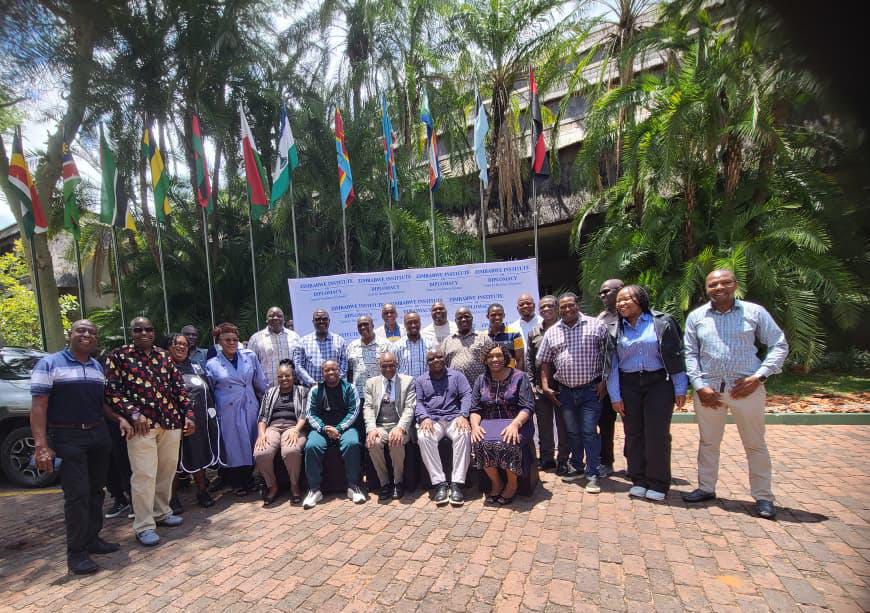“There are no permanent friends or enemies but there are permanent interests”. This came out in an animated presentation delivered by Mr V. A Chikanda, the Chairperson of the Zimbabwe Institute of Diplomacy on 25 April 2018. The students of the Diploma in Contemporary Diplomacy and International Relations profited from this high spirited and active discussion with the Chairperson.
In his presentation, Mr Chikanda noted that, in this contemporary world no state actor can avoid involvement in the international sphere. This involvement must be systematic and based on some well-defined principles. The principle and the purpose of a state is reflected in its foreign policy. The importance of foreign policy is accepted widely and it basically defines a state’s approach towards the other states.
Foreign policy should protect the territorial integrity of the country and protect the interests of its citizens, both within and outside the country. Generally for this purpose the states prefer to follow policy of status quo. If a state pursues a policy which seeks to upset the status quo it is branded as pragmatic and arouses the suspicion of other members of the international community. As realists say, states constantly make inferences about each other’s motivations. It has to protect the interests of its citizens both inside and outside the state, for the maintenance of its prestige.
Secondly, the objective of foreign policy should be the maintenance of cordial relations with other members of international system and adoption of policy of conflict or cooperation towards them with a view to promote its own interests. Furthermore, the foreign policy of a country should seek to promote and further its national interests of the country. The primary interests of each state are preservation, security and well-being of its citizens. Often, the interests of various states come in clash and the states have their interests
At the same time, the foreign policy should aim at promotion of economic interests of the country. As the status of a state is largely determined by its economic status, the states try to pursue a foreign policy which can contribute to their economic prosperity and enable it in turn to play a more effective role in international politics. Most of the treaties and agreements concluded by the state with other members of international community are essentially designed to protect and promote the economic interests of these states. Ultimately, the foreign policy aims at enhancement of the influence of the state either by expanding its area of influence or reducing the other state to the position of dependency, like the case of African states.
It is important that Zimbabwe and other African states foreign policies are able to pursue these objectives in their true spirit. Unfortunately, because of factors like civil unrest and economic and political fragility have made Africa dependent on external countries to a large extent and, therefore, the true objectives of the foreign policy are hardly being achieved by many African states. Additionally, the country that cannot define and pursue properly its national interests, resultantly, remained weaker in international arena.
There are different factors that influence the foreign policy of a country. In the first place the size of a state’s territory and its population greatly influences its foreign policy. Generally, the leaders and people of a country with small territory and population do not expect their country to carry great weight in international affairs. On the other hand, the leaders and people of large countries are ready to assume special responsibilities. However, sometime even small states which have rich resources also leave a deep impact on world politics.
The geography of a country, including its fertility, climate, location in relation to other land masses and water-ways etc. also influence the country’s foreign policy. It is a major factor in determining self-sufficiency of a country. Generally landlocked countries, nations in the tropics and those bordering a superpower are less self-sufficient in comparison to the countries which have access to warm-water ports or are located in the temperate zones and far removed from superpowers.
The cultural and historical traditions of a country also deeply influence the foreign policy. Generally, people possessing a unified common culture and historical experience can pursue an effective foreign policy because of the support of all sections of society who share the same values and memories. On the other hand, a country which is culturally and historically fragmented cannot pursue an equally effective foreign policy.
Apart from these internal factors there are certain external factors as well that influence the foreign policy of a country. The contemporary international organizations greatly influence the foreign policy of a country. While formulating its foreign policy the country has to take note of the international law, treaties and contracts. No country can ignore these factors without jeopardizing its own interests. Apart from the structure at the global level, the structures at the regional and sub-regional levels also greatly influence the foreign policy of a country.
In Africa, the international influence is on a large scale for he who pays the piper dictates the tune. As the continent has been dependent on international organizations and other powerful countries, its foreign policy has always been under pressure. As far as the internal factors are concerned, Africa’s geography, though gifted with mineral resources, has been the battle ground for great games. This has influenced the continent to a great extent.




